Once upon a time in Russia they did not hear about infant formula at all and found an alternative to the mother product without any problems. Today's mothers are increasingly wondering at what age they can give their baby milk, and what source of nutritional fluid is most acceptable.
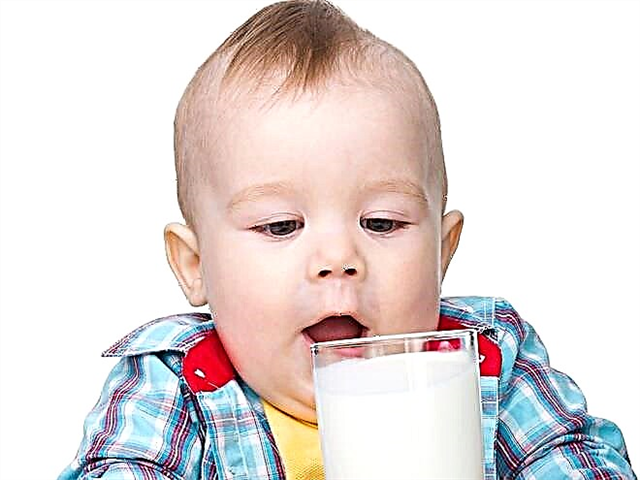
When can you give milk?
The benefits of milk for the baby
The basis of baby food for the little ones is dairy products. For the first six months, the baby is breastfed. If the mother has problems with lactation (or for other reasons), the baby is given adapted infant formula, in the preparation of which factories use milk.
The time comes when the baby is introduced to a natural animal product. For some children, milk can cause allergies, for some it becomes one of the main food components of the diet.
Composition and nutritional value
Milk contains substances necessary for the human body: fats, proteins, carbohydrates, inorganic salts, vitamins, hormones. In total, there are about 100 different components in the composition, the list of which also includes immune bodies.
The proteins in the composition are multicomponent and represent a symbiosis of albumin, casein and globulin. An important energy source contains the entire range of amino acids.
In terms of nutritional value, 1 liter of the drink can replace a number of other products:
- 500 g of beef or 700 g of veal;
- more than 3 kg of vegetables;
- 8 chicken eggs.
Therefore, the child's body in the process of development must consume a certain portion of milk every day.
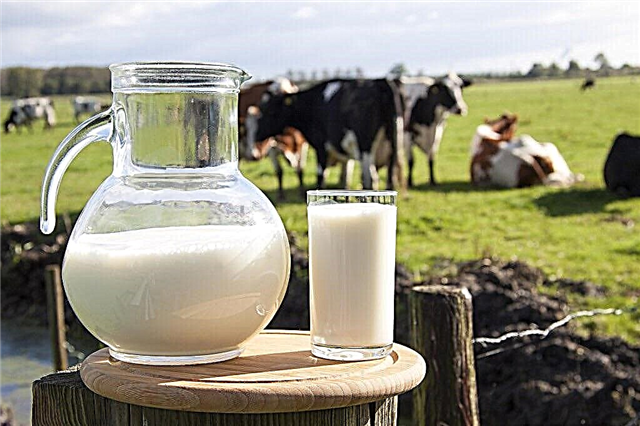
Burenka product
Macro - and trace elements present in the product are necessary for the synthesis of enzymes in the child's body. A high percentage of calcium contributes to the formation of bone tissue. Phosphorus has a beneficial effect on mental development.
Vitamins, mineral salts and other valuable components are involved in the renewal of blood and help to balance the work of all systems. Many different products are prepared from milk: kefir, yogurt, sour cream, cottage cheese, cheeses, yoghurts. Each of them has nutritional value if produced without disrupting technology.
How to choose the right one
Fresh whole milk is especially useful - it has bactericidal properties. Babies should not give such a product without preliminary processing. The imperfect digestive system of young children will not be able to cope with the microorganisms present in milk.
When introducing a product into the diet of a toddler, mom not only has to boil it, but also be able to choose the right one, evaluating quality and safety.
Home or store
Natural milk obtained from a cow or goat possesses valuable properties. If there are no livestock in the household, you should not buy a drink from random distributors in the market.
It is important to know in what conditions the animal is kept, what it eats, whether it has been treated with antibiotics. These moments can cause intestinal upset, allergies in the baby or provoke other problems.
If you are not sure of the quality of a homemade product, it is better to buy a store product adapted to the baby's age. The brands "FrutoNyanya", "Tema", "Agusha" have proven themselves well. They are ready to use and do not require additional boiling.
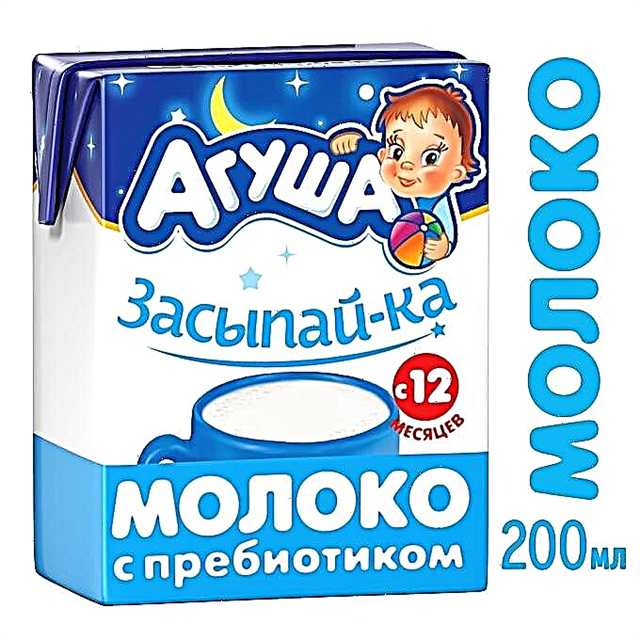
Popular brand
Note! Regular pasteurized milk produced at the plant, despite filtration and heat treatment, is recommended to be boiled before use.
Cow or goat
If we compare animal milk with female milk, then the first in composition is significantly inferior to the maternal product. When choosing a homemade drink, most parents proceed from their own preferences, considering cow's milk to be familiar and affordable. A goat product is almost identical in composition and value to a cow product, but it is more fatty in consistency and has a specific smell.
Important! If the baby's body reacts negatively to milk from a cow, then pediatricians give mothers advice to try first goat, which has anti-allergenic properties.
From how many months to introduce into complementary foods
Feeding babies is conventionally divided into steps. The third stage involves the introduction into the diet of foods that benefit the body and at the same time are safe for it. Dairy products are introduced into the menu; this moment falls on the period from 8 months to a year.
The perception of a cow's drink is individual in each case. Not all 8-month-old babies have a digestive system that responds adequately to the product. According to Dr. Komarovsky, the question of how much, when to introduce milk into the child's diet, the mother decides together with the doctor.
Most pediatricians recommend postponing this moment for up to a year. Because of its high protein content, cow's or goat's milk in young children can cause intestinal upset and other problems.
How to give cow's milk
Lactic acid products (cottage cheese, kefir, curdled milk) obtained by fermentation are the first to be introduced into complementary foods. They are more easily absorbed by the food channel, thanks to the transformation of proteins into delicate small flakes.
Note! During the curdling process, lactose is converted into lactic acid. Its presence increases the absorption of phosphorus and calcium present in the product.
If the crumbs' body accepts cottage cheese or kefir well, then over time, cow's milk can also be introduced into the diet. To begin with, it is diluted with water at a concentration of 1: 5 and porridge is boiled. If the dish is absorbed by the body, the ratio of liquids is changed, gradually increasing the proportion of the cow's product.
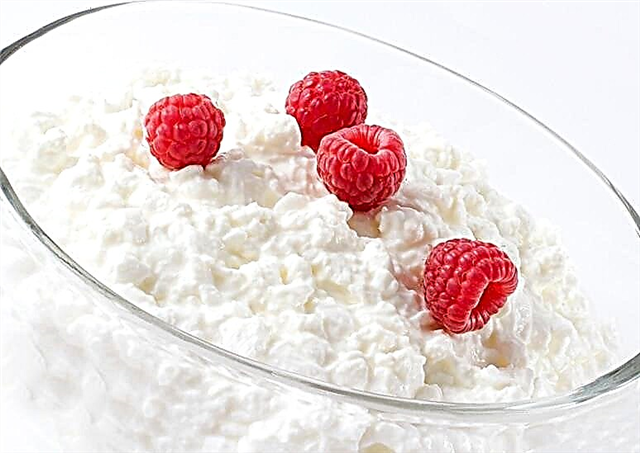
The first dairy product
The boiled drink itself is also given in stages:
- first, milk (it is better to take 3.2% fat) is diluted with water in a ratio of 1: 3 and give the crumbs 1 tsp. per day;
- then, without changing the percentage, increase the amount of the drink;
- closer to the year, milk becomes more concentrated (the amount of water in it decreases).
Important! If the toddler develops an allergy at any of the stages, the dairy product is immediately taken out of use. After waiting 1-2 months, you can try again.
There are situations when babies refuse to drink cow's milk, even if their body accepts it well. You don't need to force the baby, but you can go for a little trick - add the drink to tea, sweeten it with honey, cook jelly.
Norms of cow's milk for complementary feeding
After discussing with the pediatrician the question of when it is possible to give the baby milk and derivatives from it, the mother draws up a complementary feeding calendar for herself. It indicates the number of products per day per month. It is recommended to split this norm by 2 times, determining the hours of taking dairy dishes:
- it is better to give cottage cheese for an afternoon snack or with porridge for second breakfast;
- kefir is recommended for the afternoon and before bedtime;
- whole milk (if it has already been introduced into the diet) is given in the morning.
The approximate introduction of milk complementary foods is shown in the table.
Norms of dairy products per month
| Age, month | Dairy products, g / day | ||
|---|---|---|---|
| cottage cheese | fermented milk drink | whole milk | |
| 8 | 10-30 | --- | --- |
| 9 | 40 | 50 | --- |
| 10 | 50 | 100 | 30 |
| 11 | 80 | 150 | 50 |
| 12 | 100 | 200 | 80-100 |
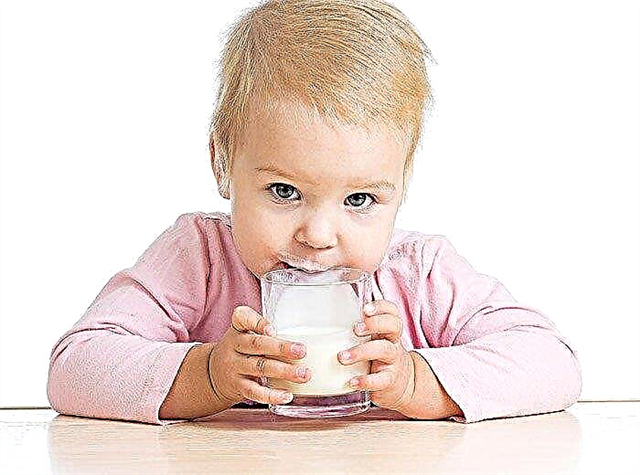
Daily rate of the product
If the baby is on artificial feeding, you do not need to wonder how to introduce milk into the baby's diet up to one year old. He has enough adapted mixtures, the number of which is gradually decreasing. Cottage cheese, kefir (yogurt) are given in the same amount as for babies.
Problems with feeding milk
The question of when to give cow's milk to an infant is by no means an idle one. In babies with early feeding, this product can provoke serious health problems:
- A small body has a hard time digesting cow casein, since it is tougher than what is found in breast milk;
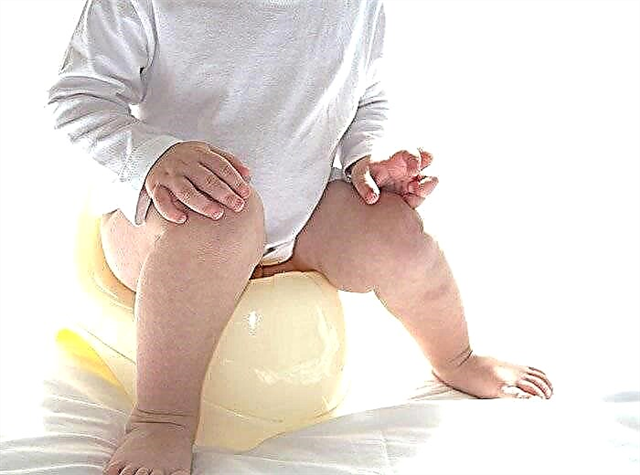
Indigestion
- The immune system of some children perceives animal protein as a foreign body and tries to get rid of it. As a result - frequent diarrhea, anemia, poor weight gain;
- The high phosphorus content puts stress on the kidneys. A malfunction of the urinary system leads to the loss of such a valuable calcium, against this background, the baby may develop rickets.
It is better not to introduce cow's milk in its pure form as usual complementary foods for babies up to a year. It is also not worth giving artificial children an animal product instead of adapted mixtures.
Important! The introduction of this drink into the diet of a newborn earlier than expected can lead to gastrointestinal bleeding.
If we delve deeper into the study of the composition of milk, cow's milk contains more sodium, calcium and protein than mother's milk. The baby's body is not able to cope with such an abundance. As a result, the kidneys are overloaded, the metabolism goes astray.
At the same time, animals in milk lack polyunsaturated acids important for the development of the human brain, a number of trace elements (iron, zinc, iodine), a group of vitamins, which negatively affects the mental development of the child.
Note. In modern babies, cow's milk often causes allergies. At the same time, the percentage of artificial people suffering from this problem is higher than those that are breastfed.
Signs of allergies
The body shows a negative reaction to the protein of cow's milk. Food allergies can affect not only a sensitive infant or a genetically predisposed one. Even the healthiest baby, if fed regularly with an animal product, will show the following symptoms:
- diarrhea or, conversely, persistent constipation;
- reflux (the release of milk back into the esophagus);
- profuse vomiting;
- respiratory symptoms (wheezing or coughing, nasal congestion);
- cutaneous (eczema, urticaria).

Food allergy
When the body is overloaded with irritants, the baby experiences constant fatigue, he starts having trouble sleeping.
Moms do not always associate the described symptoms with allergies. Spitting up after feeding, baby's whims are perceived as a standard behavioral phenomenon. Runny nose, cough are referred to as a cold symptomatology.
The difficulty in diagnosing allergies lies in the fact that many signs do not appear immediately - it may take 2 hours or several days after the baby is given an animal drink.
From all that has been said above, the conclusion suggests itself: a mother should be worried not only when it is possible to give a baby cow's milk, but also the consequences of introducing such complementary foods into the diet.



